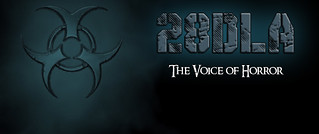*full disclosure: a DVD screener of this film was provided by Breaking Glass Pictures.
Director: Zack Parker.
Writers: Brandon Owens, and Zack Parker.
Cast: Margo Martindale, Hanna Hall, Adam Scarimbolo, Jim Dougherty, LaDonna Pettijohn, Raymond Kester, Angela Steele, Sean Blodgett, Frank T. Ziede, Mark A. Nash, and Eric Monroe.
Tagline: "The truth is just a point of view."
Scalene is an exceptional film built around three characters' perspectives. Each has their own truth in relation to certain tragic events. Zack Parker's third film also sets up those tragic events with a reverse narrative. The film's story begins from a certain violent point and then works its way backwards through each characters' eyes. This storytelling style is effective and Scalene will hopefully find a large audience when it releases later this month.
A scalene triangle has three unequal sides. The perspectives in the film are also unequal. Jakob's (Adam Scarimbolo) perspective is the smallest. He has suffered an anoxic brain injury through drug use. His perspective is disjointed and his perceptions are altered by his diminished capacity. It is hard to know what is real when looking at the story through Jakob's eyes. Janice (Margo Martindale) is Jakob's mother. She acts as the vengeful angel in the beginning of the film. She seems to be a protective mother, but maybe she is something else. She is definitely rude to Paige (Hanna Hall), Jakob's caretaker. And Paige's perspective offers the most insight. Perhaps, she sees Janice as she truly is, vindictive. Her story is the longest of the tales and told last.
This interesting use of a backwards timeline is rarely used. Not since Memento (2000) has a story been told in this style with such precision. Each scene is a sample in one of the character's lives. Each block in the timeline is told with forward progression, but the overall arc is told mostly in reverse. This style of filmmaking takes a little time to get used to. However, if you stick with it, then your patience will be rewarded with a challenging truth.
Yet, each character has a different truth. Janice sees herself as a caring mom who has sacrificed a lot. Paige sees her differently; she is an overbearing and damaging mother. Jakob sees very little. But, what he sees is often tragic. He is both vulnerable and abused. Paige's perspective is the most tragic. Arguably, she gets too close to the family she is working for. Her actions are difficult to watch. However, her intentions are probably the most earnest.
Scalene is not a heartwarming film. There is tragedy here at every step. Director Parker captures all of this drama with an effective and developing camera eye. The directing techniques in the film range from extreme closeups to revolving pans. The camera is often moving, but some steady shots heighten the difficult scenes. The original score amplifies the tension on the screen, while offering few light notes. The open ending might promise a sliver of hope. Yet, the majority of this film is coloured in dark tones, so it is best to be cynical as the credits roll.
This is both an effective and affective film that will stay with viewers. The unorthodox storytelling and directing style keep events on the screen compelling. The change of one character from protagonist to antagonist is also a curious shift. There is much tragedy in Scalene. There is also a lot of truth. The different perspectives paint the other two characters differently. And, this reviewer would whole-heartedly recommend this film to fans of tragedy and drama in film.
Overall: 8.5 (the storytelling style is experimental and the risk pays off, great acting, a well rounded story, great use of reverse narrative).
The film's fan page is here:
Scalene on Facebook
| | |
Advertise Here - Contact me Michael Allen at 28DLA
Subscribe to 28 Days Later: An Analysis Email Subscription
Director: Zack Parker.
Writers: Brandon Owens, and Zack Parker.
Cast: Margo Martindale, Hanna Hall, Adam Scarimbolo, Jim Dougherty, LaDonna Pettijohn, Raymond Kester, Angela Steele, Sean Blodgett, Frank T. Ziede, Mark A. Nash, and Eric Monroe.
Tagline: "The truth is just a point of view."
Scalene is an exceptional film built around three characters' perspectives. Each has their own truth in relation to certain tragic events. Zack Parker's third film also sets up those tragic events with a reverse narrative. The film's story begins from a certain violent point and then works its way backwards through each characters' eyes. This storytelling style is effective and Scalene will hopefully find a large audience when it releases later this month.
A scalene triangle has three unequal sides. The perspectives in the film are also unequal. Jakob's (Adam Scarimbolo) perspective is the smallest. He has suffered an anoxic brain injury through drug use. His perspective is disjointed and his perceptions are altered by his diminished capacity. It is hard to know what is real when looking at the story through Jakob's eyes. Janice (Margo Martindale) is Jakob's mother. She acts as the vengeful angel in the beginning of the film. She seems to be a protective mother, but maybe she is something else. She is definitely rude to Paige (Hanna Hall), Jakob's caretaker. And Paige's perspective offers the most insight. Perhaps, she sees Janice as she truly is, vindictive. Her story is the longest of the tales and told last.
This interesting use of a backwards timeline is rarely used. Not since Memento (2000) has a story been told in this style with such precision. Each scene is a sample in one of the character's lives. Each block in the timeline is told with forward progression, but the overall arc is told mostly in reverse. This style of filmmaking takes a little time to get used to. However, if you stick with it, then your patience will be rewarded with a challenging truth.
Yet, each character has a different truth. Janice sees herself as a caring mom who has sacrificed a lot. Paige sees her differently; she is an overbearing and damaging mother. Jakob sees very little. But, what he sees is often tragic. He is both vulnerable and abused. Paige's perspective is the most tragic. Arguably, she gets too close to the family she is working for. Her actions are difficult to watch. However, her intentions are probably the most earnest.
Scalene is not a heartwarming film. There is tragedy here at every step. Director Parker captures all of this drama with an effective and developing camera eye. The directing techniques in the film range from extreme closeups to revolving pans. The camera is often moving, but some steady shots heighten the difficult scenes. The original score amplifies the tension on the screen, while offering few light notes. The open ending might promise a sliver of hope. Yet, the majority of this film is coloured in dark tones, so it is best to be cynical as the credits roll.
This is both an effective and affective film that will stay with viewers. The unorthodox storytelling and directing style keep events on the screen compelling. The change of one character from protagonist to antagonist is also a curious shift. There is much tragedy in Scalene. There is also a lot of truth. The different perspectives paint the other two characters differently. And, this reviewer would whole-heartedly recommend this film to fans of tragedy and drama in film.
Overall: 8.5 (the storytelling style is experimental and the risk pays off, great acting, a well rounded story, great use of reverse narrative).
The film's fan page is here:
Scalene on Facebook
| | |
Advertise Here - Contact me Michael Allen at 28DLA
Subscribe to 28 Days Later: An Analysis Email Subscription


 Friday, July 06, 2012
Friday, July 06, 2012
 Michael Allen
Michael Allen




 Posted in:
Posted in: 


0 comments:
Post a Comment